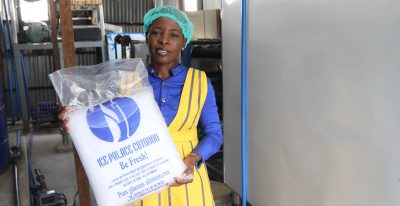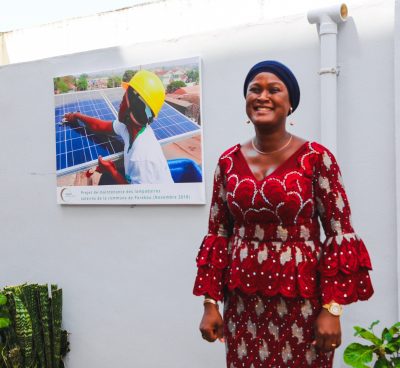
MCA-Benin
The Benin Power Compact is helping entrepreneurs like Irene Pazou [above] overcome the challenges many businesswomen in Benin face.
While women make up almost half of all entrepreneurs in Benin, they disproportionately face structural hurdles, limited access to information and training, difficulty in accessing credit, and an assumption that women do not work in certain fields. This not only hampers the prospects of women entrepreneurs but the economic future of the country as a whole.
It is not just Ice Palace that has struggled with reliable electricity access. In Benin, while demand for electricity is increasing, only around one third of population has access to electric power. The deficit of reliable electrical service increases the cost of doing business, complicates social service delivery, and hinders household well-being.
To address these issues, MCC and the Government of Benin signed the $391 million Benin Power Compact in 2015 to modernize Benin’s electric power sector by supporting policy reforms, upgrading Benin’s power grid, and attracting private sector investment. Through the compact, MCC also supported women entrepreneurs to grow their businesses and give them tools to take advantage of improved electric power service.
The Women’s Energy Entrepreneurship (WEE) initiative funded by the compact trained and provided mentoring to businesses owned or managed by women, helping them grow their companies, expand productivity, increase energy efficiency, and create new economic opportunities. The result: stronger sales for 75% of participating women entrepreneurs, despite the timing at the height of the COVID pandemic.
In addition, nearly every participating business reported improvements to their management and financial systems as well as increased leadership and self-esteem. The program did not provide financing but the improved planning and business skills led to around half of the participants negotiating additional grants or loan financing. The businesses not only benefitted from the improved stability of the electricity grid ensured by the compact’s infrastructure investments, they also achieved cost savings through training, coaching and investments in energy efficiency practices. Nearly three quarters of the WEE participants added energy consumption monitoring and measurement tools, and all of them implemented simple solutions like efficient lighting, improved machine maintenance, and other practices.
Irene from Ice Palace has a lot to say about all the improvements she has implemented since participating in the program, from significantly reducing her energy bills through energy efficiency, to systematizing her management practices, to using digital skills, and to increasing her confidence as a business leader.
“Since participating in this program, I now know how to manage my contracts effectively. I don’t just hire people, I sign contracts with them, and I know how to enforce them. I have used the digital skills I learned to make sure my business comes to the top of your google search. I am going to achieve my dream of building and expanding my business in terms of geographical coverage, activities, markets income and making Ice Palace Cotonou the number one business in Benin,” she said.

Madame Ismène founded Ismast Energy LLC, one of a few women-owned renewable energy product supply companies in Benin.
The WEE initiative is just one of many programs that have resulted from MCC’s partnership with Benin. By funding a major expansion and modernization of Benin’s electrical grid, through the construction or rehabilitation of 19 substations and 878 km of new or upgraded power lines, a new national dispatch and control center, and stronger power sector regulation, the compact has tripled the capacity of Benin’s national power grid.
Additionally, the compact improved access to electricity in rural areas by co-financing 55 solar
mini-grids, which are expected to benefit approximately 110,000 people, and subsidizing the sale of 37,000 solar home systems allowing 1850,000 people to access energy in their homes, many for the first time, particularly in northern Benin.All told, MCC’s compact with Benin is expected to benefit 11 million people, and women energy entrepreneurs like Irene Pazou and Ismène Ahamide Zounmenou are playing a key role in the future success of the Benin energy sector.

